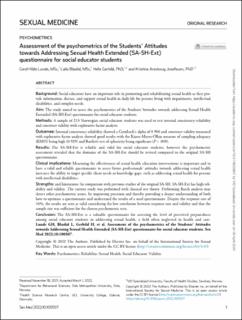| dc.contributor.author | Lunde, Gerd Hilde | |
| dc.contributor.author | Blaalid, Laila | |
| dc.contributor.author | Gerbild, Helle | |
| dc.contributor.author | Areskoug Josefsson, Kristina | |
| dc.date.accessioned | 2024-04-10T07:35:24Z | |
| dc.date.available | 2024-04-10T07:35:24Z | |
| dc.date.created | 2022-02-24T12:23:14Z | |
| dc.date.issued | 2022 | |
| dc.identifier.citation | Sexual Medicine - Open Access. 2022, 10 (3), . | en_US |
| dc.identifier.issn | 2050-1161 | |
| dc.identifier.uri | https://hdl.handle.net/11250/3125670 | |
| dc.description.abstract | Background: Social educators have an important role in promoting and rehabilitating sexual health as they pro- vide information, discuss, and support sexual health in daily life for persons living with impairments, intellectual disabilities, and complex needs. Aim: The study aimed to assess the psychometrics of the Students Attitudes towards addressing Sexual Health Extended (SA-SH-Ext) questionnaire for social educator students. Methods: A sample of 213 Norwegian social educator students was used to test internal consistency reliability and construct validity with explorative factor analysis. Outcomes: Internal consistency reliability showed a Cronbachs alpha of 0.906 and construct validity measured with explorative factor analysis showed good results with the Kaiser-Meyer-Olkin measure of sampling adequacy (KMO) being high (0.929) and Bartletts test of sphericity being significant (P = .000). Results: The SA-SH-Ext is reliable and valid for social educator students, however the psychometric assessment revealed that the domains of the SA-SH-Ext should be revised compared to the original SA-SH questionnaire. Clinical implications: Measuring the effectiveness of sexual health education interventions is important and to have a valid and reliable questionnaire to assess future professionals’ attitudes towards addressing sexual health increases the ability to target specific client needs or knowledge gaps, such as addressing sexual health for persons with intellectual disabilities. Strengths and limitations: In comparison with previous studies of the original SA-SH, SA-SH-Ext has high reli- ability and validity. The current study was performed with classical test theory. Performing Rasch analysis may detect other psychometric issues, by improving precision and thereby providing a deeper understanding of both how to optimise a questionnaire and understand the results of a used questionnaire. Despite the response rate of 34%, the results are seen as valid considering the low correlation between response rate and validity and that the sample size was sufficient for the chosen psychometric tests. Conclusion: The SA-SH-Ext is a valuable questionnaire for assessing the level of perceived preparedness among social educator students in addressing sexual health, a field often neglected in health and care. | en_US |
| dc.language.iso | eng | en_US |
| dc.rights | Navngivelse 4.0 Internasjonal | * |
| dc.rights.uri | http://creativecommons.org/licenses/by/4.0/deed.no | * |
| dc.title | Assessment of the Psychometrics of the Students Attitudes towards Addressing Sexual Health Extended (SA-SH-Ext) Questionnaire for Social Educator Students | en_US |
| dc.type | Peer reviewed | en_US |
| dc.type | Journal article | en_US |
| dc.description.version | publishedVersion | en_US |
| cristin.ispublished | true | |
| cristin.fulltext | original | |
| cristin.qualitycode | 1 | |
| dc.identifier.doi | 10.1016/j.esxm.2022.100507 | |
| dc.identifier.cristin | 2005113 | |
| dc.source.journal | Sexual Medicine - Open Access | en_US |
| dc.source.volume | 10 | en_US |
| dc.source.issue | 3 | en_US |
| dc.source.pagenumber | 9 | en_US |
| dc.subject.nsi | VDP::Samfunnsvitenskap: 200 | en_US |
| dc.subject.nsi | VDP::Social sciences: 200 | en_US |

